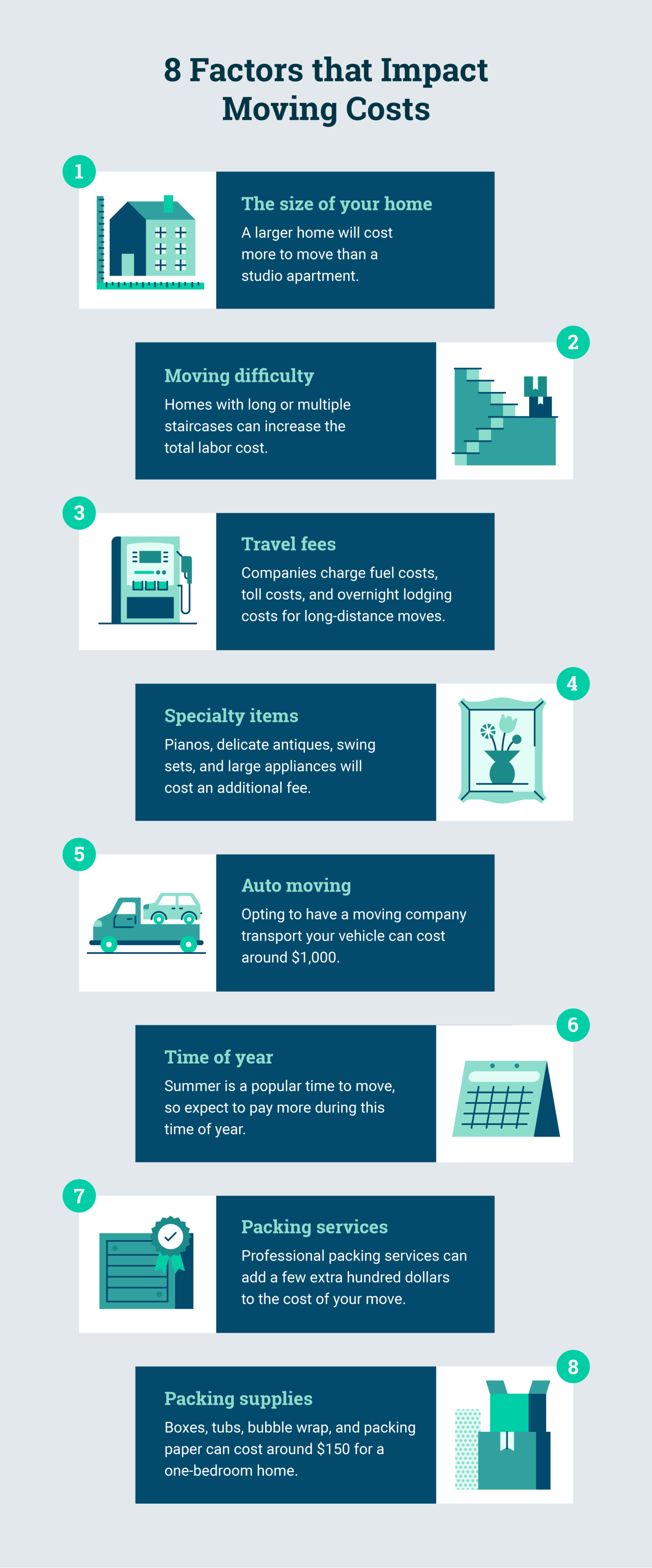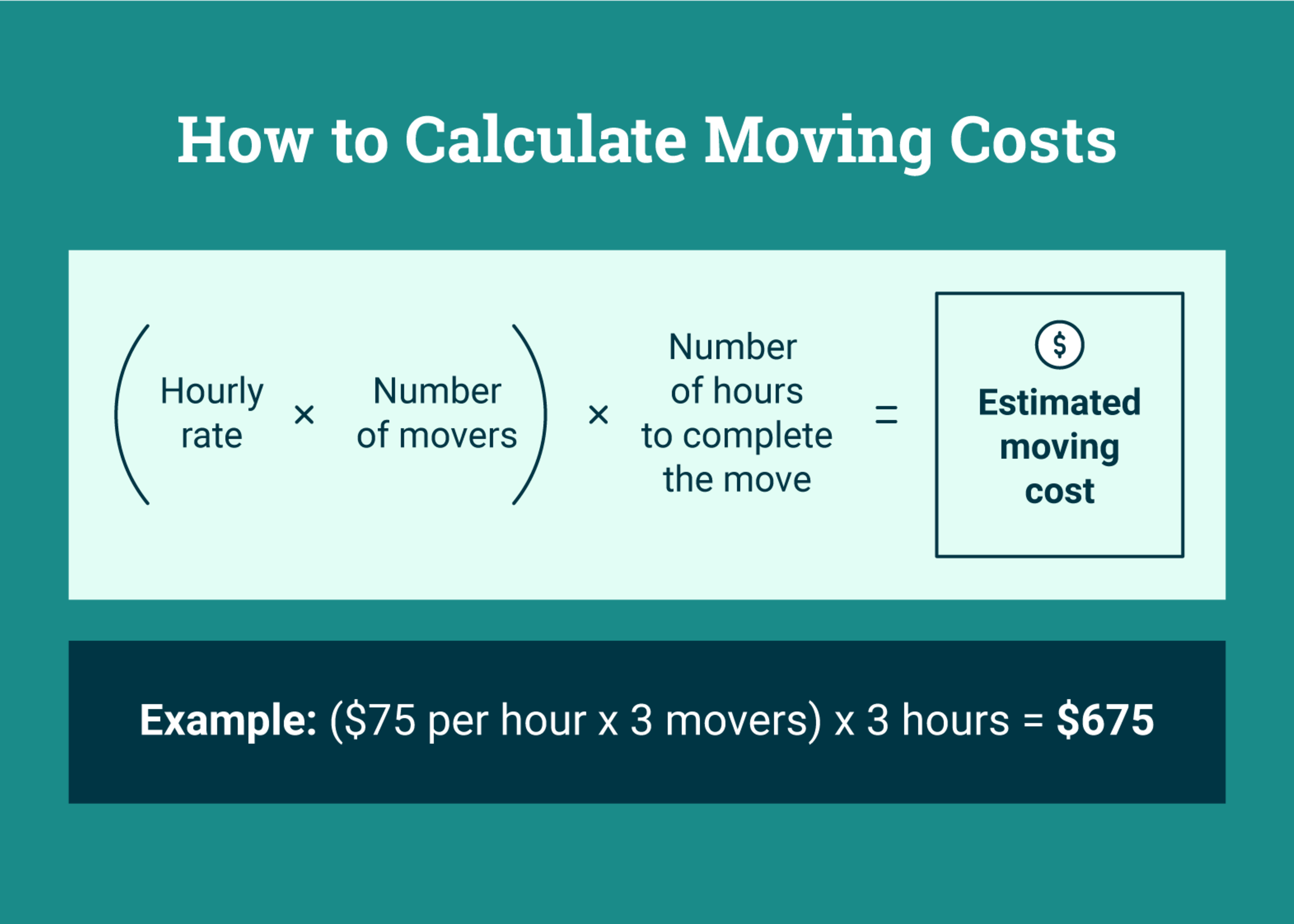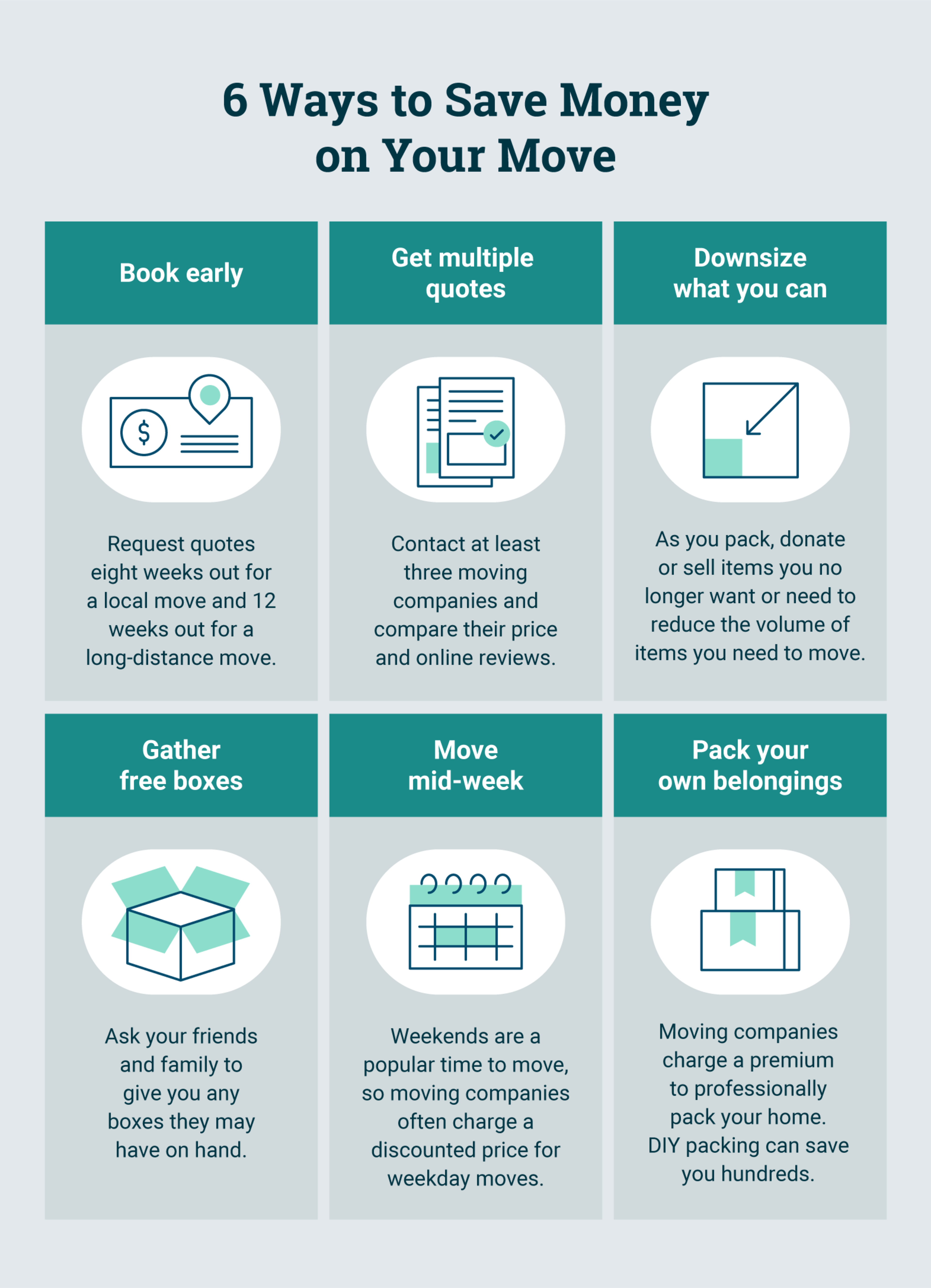How Much Do Movers Cost? [2024]

Local moves cost an average of $725 for a two-bedroom home. Long-distance moves cost an average of $4,500 to move a two-bedroom home 1,000 miles. However, the cost of a move can vary greatly depending on the size of your home and the volume of belongings you have.
Moving can be a daunting prospect. Not only do you have to pack up everything you own into an assortment of boxes and tubs, but you also have to factor in the cost of it all — which typically comes with a hefty price tag.
Before you pick the best moving company for the job, it can help to have a general idea of how much your move will cost. Below, we dig into the average cost of moving and offer tips on how to save.
Average Cost of Movers
Local moves cost an average of $725 for a two-bedroom home. Long-distance moves cost an average of $4,500 to move a two-bedroom home 1,000 miles.
However, these are general estimates and a move can include significantly more depending on:
The size of your home
The number of belongings you have
Whether you have specialty items
Whether you pack your home yourself
How Much Do Movers Cost for a Local Move?
Local moves (distances less than 100 miles from your starting point) are typically priced by the hour. This hourly fee may or may not include the moving truck, so be sure to check with companies as you gather quotes so you know what exactly they include with their cost estimate.
Local moves can cost between $500 to $3,000, depending on the size of the home you're moving from. Studio apartments cost the least amount, while four- and five-bedroom homes will cost significantly more.
Local Moving Cost Estimates
How Much Does a Long-Distance Move Cost?
The cost of a move increases drastically if you’re traveling a long distance. Moves are considered long-distance if your new address is more than 100 miles from your original home.
Rather than charging an hourly rate like most local moving companies, long-distance movers charge a flat fee based on your starting point, ending point, and the total weight or volume of your belongings. These moves will also include things like fuel costs and lodging costs for movers if the trip will last longer than one day.
The average cost of a long-distance move can cost anywhere between $2,200 to $14,100, depending on the size of the home you’re packing up and the distance to your new home.
Long-Distance Moving Cost Estimates
How Much Do Movers Cost Per Hour?
Many local movers charge by the hour rather than a flat fee. On average, the hourly rate per mover is usually between $50 to $100. For a two-hour move with two movers, you can expect to pay an average of $268.
The general rule of thumb is that it takes about four hours to move a one-bedroom home, six hours to move a two- or three-bedroom home, and eight or more hours to move a four-bedroom home.
Factors that Impact the Cost of a Move
The number of belongings you have and the distance you need to move them are the two biggest factors in determining the cost of a move. However, there are many other variables to consider as you budget for moving costs.
The size of your home: The larger your home and the more belongings you have, the more expensive your move will be.
Your home’s location: If you live in a fifth-floor walk-up apartment with no elevator, you may be charged more per hour to move your items. This is because it’s a more labor-intensive move than, for example, someone in a second-floor apartment with access to an elevator.
Travel fees: For long-distance moves, moving companies factor in fuel costs and labor costs for the time it takes movers to get from point A to point B.
Speciality items: Pianos, large appliances, swing sets, and delicate antiques add to the cost of your move as they require special care and tools to move.
Auto moving: Homeowners moving long distances often opt to have a moving company move their vehicles along with their belongings. This costs an average of $1,000 per vehicle.
Time of year: Summer tends to be a more expensive time to move because it’s peak season and movers are busy. Expect to pay more during this time of the year compared to slower seasons like the fall or winter.
Packing services: If you’re under a time crunch to move, you may want to pay for packing services offered by a moving company. They’ll carefully pack up and label all of your items for a few hundred extra dollars, depending on the amount of packing required.
Packing supplies: If you’re packing up your own home, you’ll likely need to purchase moving boxes, bubble wrap, packing paper, and tubs. If you’re packing for a moving company to pack your items, they may charge you for these extra packing supplies. However, moving companies sometimes offer a discounted rate compared to what you would pay in-store.

How To Calculate Moving Costs
If you want an idea of how much your move might cost, there’s a simple formula you can use.
(Hourly Rate x Number of Movers) x Number of Hours to Complete the Move = Estimated Moving Cost
For example, if a moving company charges an hourly rate of $75 and you hire three movers, the hourly labor cost will be $225. If the move takes three hours to complete, $225 times three hours equals a total of $675. Additional factors like transportation costs and packing services will be tacked on to that $675 estimate.
Remember that you can use this formula to help gauge the cost of a move, but the best way to get a sense of the real cost is to get a quote from local movers.

How To Save Money on Your Move
While moving is an expensive endeavor, there are steps that can help lower the total cost. Below, we highlight a few cost-saving tips for your upcoming move.
Book early: Plan to gather quotes at least eight weeks in advance for a local move and 12 weeks in advance for a long-distance move. Contacting moving companies this far in advance will help you get the best price and have the largest selection of moving companies to choose from.
Get multiple quotes: Rather than contacting only one moving company, we recommend gathering quotes from three to four moving companies to compare price, company reviews, and whether each company offers additional services you may need, like auto moving and packing services.
Downsize what you can: The more belongings you have, the more it will cost to move them. As you’re packing up your home, create donation and to-sell piles for things that outlived their use, don’t fit your style anymore, or may not fit in your new home.
Gather free boxes: Tip off your friends and family that you’re packing and ask them to give you any boxes or packing materials they may have laying around. You can also call up local businesses to see if they’ll let you pick up boxes for free or a small fee.
Move midweek: Weekends are the most popular time of week to move. If you can plan for a midweek move, you’ll likely receive a discounted price.
Pack your own belongings: Packing is one of the most-dreaded aspects of moving, but doing it yourself rather than paying a moving company can save you a few hundred dollars.

FAQ
We answer a few common moving cost questions below.
Find a Local Mover Near You
No matter how you slice it, moving can be expensive. To find the best deal, we recommend gathering quotes from a few different moving companies before you book.
Looking for trusted local movers near you? Expertise has vetted and reviewed top moving companies in your zip code to help you find the perfect pros for the job.
Expertise.com StaffAuthor
Step into the world of Expertise.com, your go-to hub for credible insights. We don't take accuracy lightly around here. Our squad of expert reviewers, each a maestro in their field, has given the green light to every single article you'll find. From rigorous fact-checking to meticulous evaluations of service providers, we've got it all covered. So feel free to dive in and explore. The information you'll uncover has been stamped with the seal of approval by our top-notch experts.




